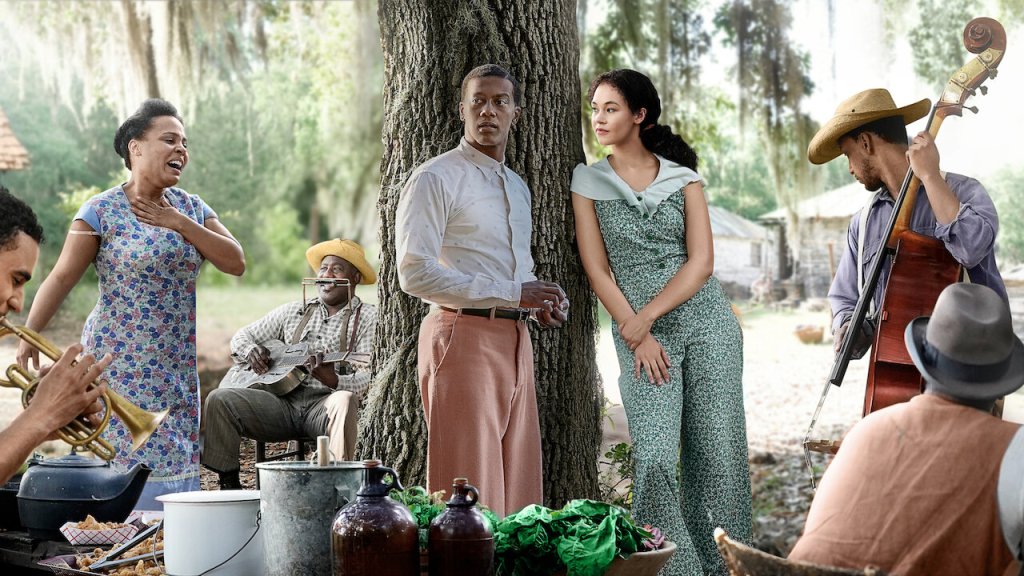A JAZZMAN’S BLUES
(director/writer: Tyler Perry; cinematographer: Brett Pawlak; editor: Maysie Hoy; music: Aaron Zigman; cast: Joshua Boone (Bayou), Amirah Vann (Hattie May), Daphne Maxwell Reid (the elderly ), Solea Pfeiffer (Leanne), Austin Scott (Willie Earl), Ryan Eggold (Ira), E. Roger Mitchell (Buster), Kario Marcel (Jonathan Dupree), Lana Young (Ethel), Milauna Jemai Jackson (Citsy), Lauren Buglioli (Margaret), Brent Antonello (John Clayton), Brad Benedict (Sheriff Jackson); Runtime: 127; MPAA Rating: R; producer: Tyler Perry; Netflix; 2022)
“Well-conceived but with a heavy-handed dark tale about forbidden love and living in the Jim Crow era.”
Reviewed by Dennis Schwartz
A soulful and technically sound melodrama, that’s well-conceived but with a heavy-handed dark tale about forbidden love and living in the Jim Crow era. It’s written and directed by the prolific but questionable filmmaker known for his business savvy, Tyler Perry (“Nobody’s Fool”/”Acrimony”), as a project of the heart, a deeper film than his usual successful fluff comedies. It has a heartfelt screenplay (written in 1995), taken from a story he wanted to do for a longtime but didn’t feel up to it.
In 1987, an elderly Georgia woman (Daphne Maxwell Reid, the elderly version of Hattie May) approaches a racist attorney (Brent Antonello) in Hopewell, Georgia, about an unsolved murder investigation in 1947 of an interracial girl, and hands him unopened letters left behind that she believes will clear-up the murder.
Then there’s a flashback to 1940 in rural Hopewell, Georgia.
It tells when the abused by his trumpet playing father (E. Roger Mitchell) and dearly loved by his caring mother, Hattie May (Amirah Vann), the owner of a laundry service, the socially awkward but sincere teenager, Bayou (Joshua Boone), proposes to the biracial and light-skinned Leanne (Solea Pfeiffer), also from an abusive family (raped by her grandfather), whose obnoxious and headstrong mom (Lana Young) sends her to live in the North, to get away from her Black lover. Bayou thereby enlists in the military. When injured in the war, he returns home and finds that Leanne’s returned home from Boston married to a white man, the son of a racist local politician, who thought he married a white woman.
Bayou goes with his overbearing older brother, a jazz trumpet player, Willie Earl (Austin Scott), to Chicago, and gets to be the jazz singer he’s destined for while playing in club that caters to whites while the performers are Black. His resentful brother realizes he’s the talented one in the family, so in despair turns to heroin (never fleshing out his character).
The star-crossed lovers reunite again in their hometown, when Leanne’s back from Boston and pregnant, as the forbidden lovers plan on leaving town together.
The bluesy music (artfully arranged by Terence Blanchard) creates a great jazz atmosphere, and the performance by Boone is ennobling. What the film lacks is emotional depth and is unable to withstand all its contrivances. Yet it’s a vast improvement over Perry’s other less serious films, and is recommended for its even-keel take on the always hot-button issue of race relations.
It played at the Toronto International Film Festival.

REVIEWED ON 1/5/2023 GRADE: B-